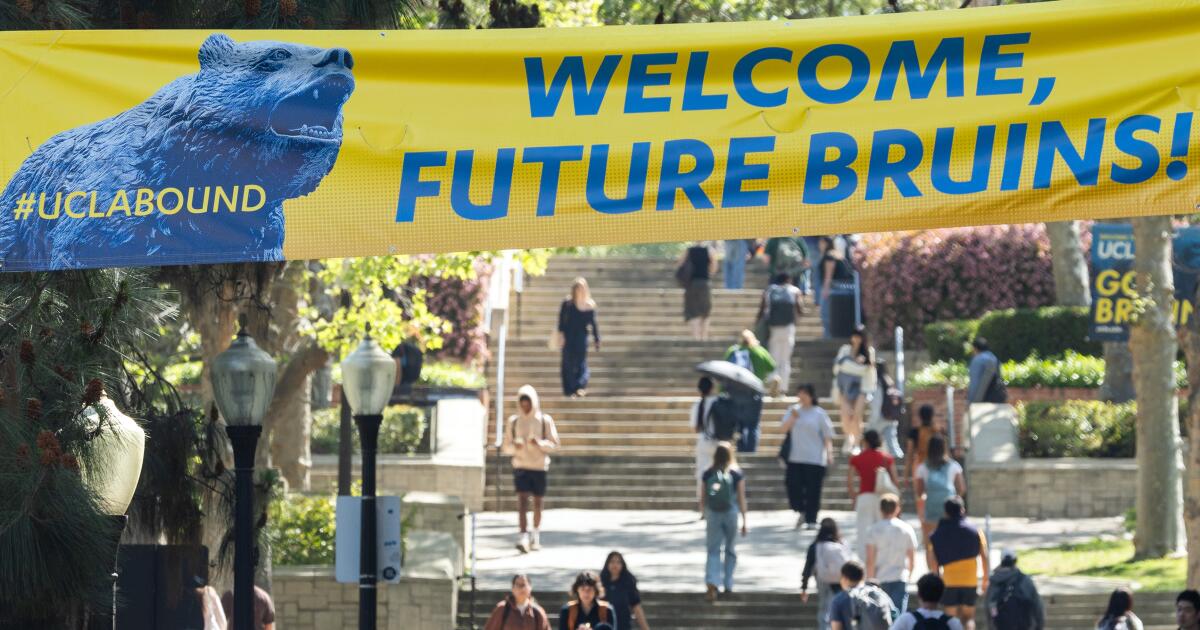What’s the difference between Harvard and UCLA when it comes to fighting President Trump’s attacks?
It may come down to how much Gavin Newsom wants his shot at the White House.
Harvard appears to be on the brink of caving to the president’s demands around claims of antisemitism and a host of issues that most would describe as policies for inclusiveness and diversity, but which Trump derides as “woke,” whatever that means.
The storied university may pay out a huge settlement — rumored to be about $500 million — to pacify an administration increasingly bent on domination of American institutions. Armed with that success, the president has targeted UCLA by freezing more than $500 million in federal grants and demanding a payout of about $1 billion.
“We will not be complicit in this kind of attack on academic freedom on this extraordinary public institution,” Newsom said recently. “We are not like some of those other institutions that have followed a different path.”
Let’s hope that’s true.
Technically, the University of California is run by the Board of Regents, of which Newsom is a member. But Newsom has so far appointed or reappointed several voting members, and you’re not going to convince me that the rest will go rogue on this decision on how to battle for the soul of UCLA, one of the most important the board will ever make.
So Newsom will be the decider, to steal a phrase from President George W. Bush.
And deciding to capitulate not only looks bad, but has terrible consequences that would dog a candidate Newsom. Not to mention crippling California as a whole.
Harvard may hold a place in the American psyche as the best of the best, but when it comes to actual impact, UCLA and the University of California system are in an entirely different league. More than 1 million Californians hold a degree from a UC, with about 200,000 currently enrolled across the system. Each year, UCLA alone contributes more than $2 billion to the local economy, and adds to the body of human knowledge with its unparalleled research in ways that money cannot quantify.
“With all respect to Harvard, the University of California dwarfs Harvard in terms of size and scale and the impact on the country,” state Sen. Scott Wiener (D-San Francisco) told me. “When you look at the UC just in terms of science and healthcare and helping to birth Silicon Valley, helping to birth the pharmaceutical industry, the UC has a cultural, educational and economic relevance unlike any other institution on the planet.”
The stakes are simply higher for California. Harvard, a private university, can not only withstand more financially, but ultimately matters less. UCLA, with great respect to UC Berkeley, is the “people’s university,” as Zev Yaroslavsky puts it. He’s a former L.A. County supervisor and current director of the Los Angeles Initiative at the UCLA Luskin School of Public Affairs.
“There is a difference between a Harvard and a UCLA, or UC Berkeley or UC San Diego or University of Michigan,” he said, and if the president managed to extract his pound of flesh, “it would bankrupt the No. 1 public university in the United States.”
The problem is this is a lose-lose situation. If the university settles, it is going to be forced to pay a tribute of hundreds of millions of dollars. While it may be able to lower the purposefully debilitating $1 billion Trump is demanding, it will still pay a price that damages it for years to come. But at least it will know the number.
If the university doesn’t settle, it risks years of litigation with no certainty of an eventual win.
On Tuesday, a federal court in a separate lawsuit ordered the administration to unfreeze more than $80 million in funding that is currently being withheld. But even with that win, the entire UC system remains in jeopardy of the president’s agenda, and there is no reason to believe the Supreme Court would side with California if or when the case made it that far.
But even if UCLA were to settle, what’s to stop Trump from coming back next year for another bite? As Yaroslavsky points out, give a bully your lunch money once, and they’ll keep coming back for more.
“There’s always a temptation to negotiate and work it out,” said Wiener, the state senator. “I don’t think that that’s an option here.”
Neither do I, though the business-minded decision would be to cut a deal. But we also have a larger issue to consider.
Education is resistance to authoritarianism, and crushing it has long been a goal of the far right. Point being, educated, free-thinking folks often prefer diversity and democracy.
In 2021, Vice President JD Vance gave a speech titled “The Universities are the Enemy,” which summed it up well.
“We have to honestly and aggressively attack the universities in this country,” he said. And here we are.
If the university of the fourth-largest economy on the planet signals that it can’t stand up to this, what university will risk it?
“California needs to say, ‘No, we’re not going to give him control over the UC, we’re not going to pay him taxpayer dollars as extortion,’” Wiener said. “If California can’t say no, then I don’t see who can.”
So once again, California — and Californians — are a line of defense. It’s up to us to let our leaders know that we don’t want our taxpayer-funded universities to cave to this assault, and that we expect our governor to fight.
It’s in his best interest, and ours.
